Does Green Tea Make You Hungry
Shop our Pu Erh Tea collections!
Green tea is known for its potential health benefits, and you may have considered it as an option for managing your hunger levels. When you consume green tea, the presence of catechins, a type of antioxidant, could influence your appetite.
Observational studies have suggested a link between green tea and appetite regulation. The compounds in green tea may interact with your metabolism in ways that affect hunger signals. Here's a breakdown of two key components:
Bestsellers
- Caffeine: Although green tea contains less caffeine than coffee, it's enough to have a mild stimulant effect. Caffeine can temporarily reduce feelings of hunger by raising levels of the hormone norepinephrine.
- Epigallocatechin Gallate (EGCG): This is a powerful catechin found in green tea that may help boost metabolism, possibly leading to a slight increase in calorie burning.
Furthermore, the act of sipping a hot beverage like green tea might offer a psychological sense of fullness, which can be separate from its physiological impact on hunger.
You should consider the following points when evaluating how green tea affects hunger:
1. Individual Responses Vary: Your own metabolic response to green tea might be different from others.2. Amount and Timing Matter: The amount of green tea you drink and when you drink it can influence how it affects your hunger.
Remember, while some people report reduced appetite with green tea, others may not notice any change. It's not a one-size-fits-all scenario. Research on green tea's impact on appetite is still evolving, therefore, it's essential to listen to your body and adjust your intake as needed.
Nutritional Content of Green Tea
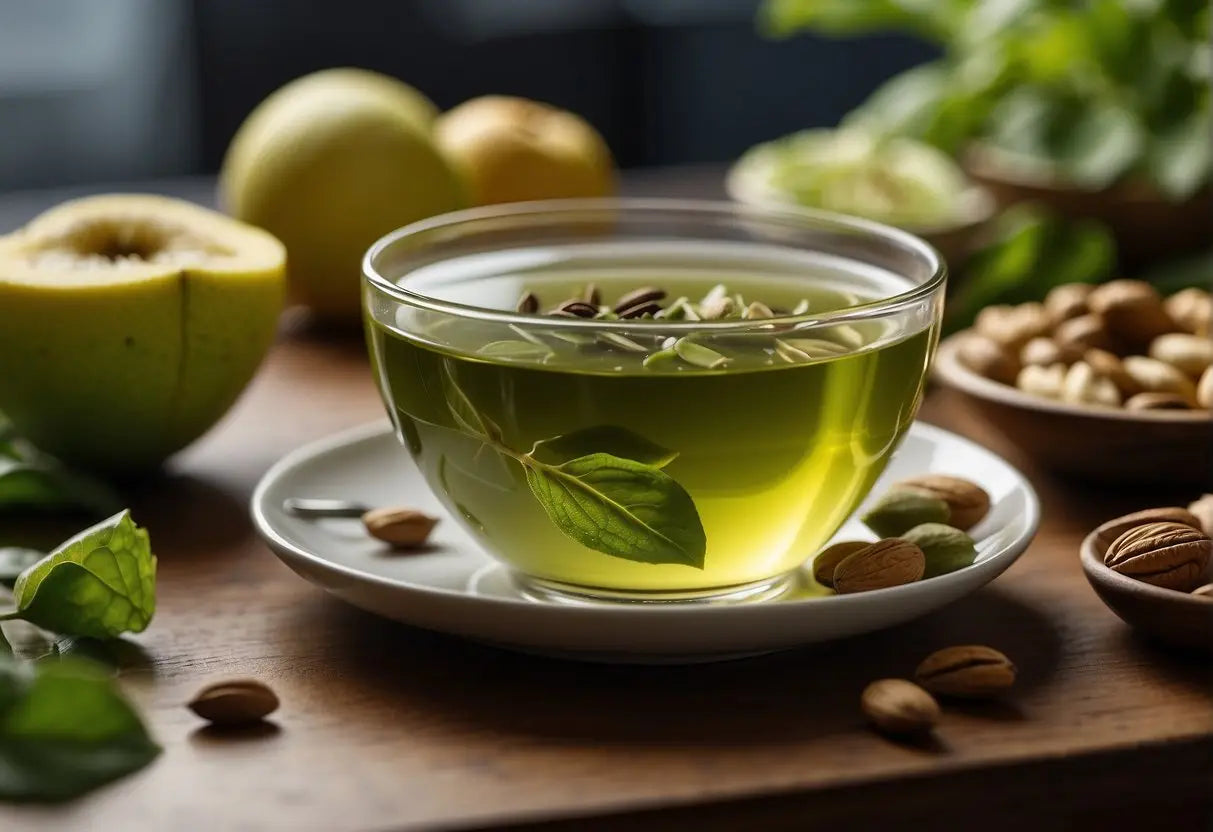
Check out our Sheng pu erh tea collection and Ripe pu erh tea collection.
Green tea is renowned for its low caloric content and rich composition of nutrients and bioactive compounds. These components contribute to its various health benefits.
Catechins and Caffeine
Green tea is particularly abundant in catechins, which are types of polyphenols with antioxidant properties. The most notable catechin in green tea is epigallocatechin gallate (EGCG). You'll also find a modest amount of caffeine in green tea, typically ranging from 20-45 mg per 8-ounce serving.
Vitamins and Minerals
Your typical cup of green tea provides various vitamins like vitamin B2 (riboflavin) and vitamin E, although in small amounts. For minerals, it contains manganese, potassium, and magnesium. Here's a quick rundown:
- Vitamin B2 (Riboflavin): Approx. 0.05 mg per cup
- Vitamin E: Approx. 0.01 mg per cup
- Manganese: Approx. 0.5 mg per cup
- Potassium: 20-50 mg per cup
- Magnesium: 3-4 mg per cup
Caloric Value
Green tea is virtually calorie-free, with a single 8-ounce cup typically containing 2-3 calories. It is important to note that adding sweeteners or milk will increase the caloric content.
Green Tea and Appetite Control

In examining the relationship between green tea and hunger, it's important to consider the effects on metabolism, hormonal interactions, and the sense of fullness.
Impact on Metabolism
Green tea has been found to increase metabolic rate due to its catechin content, particularly epigallocatechin gallate (EGCG), which can enhance the process of thermogenesis—the body's internal production of heat. This metabolic boost may lead to increased calorie burn and, over time, could indirectly influence your hunger levels by affecting body weight and fat percentage.
Lao Ban Zhang
Appetite Hormones Interaction
Catechins in green tea are also thought to play a role in modulating appetite hormones like ghrelin that stimulate hunger signals. By interfacing with these hormones, green tea may contribute to a reduction in your overall appetite. Furthermore, the amino acid L-theanine, prevalent in green tea, can impact neurotransmitters in the brain, which helps in regulating mood and potentially suppressing the urge to eat.
Satiety and Fullness
Studies suggest that the combination of caffeine and catechins found in green tea can prolong the feeling of satiety, meaning you feel full for longer after drinking it.
- Increased satiety: Can delay the onset of hunger.
- Caffeine effect: May lead to a decrease in food intake.
Research Evidence on Green Tea and Hunger
Research into green tea's effects on hunger reveals contrasting results depending on the study focus—whether on humans or animals.
Human Studies Findings
Numerous controlled trials have shown that green tea can influence appetite. For example, a study published in the Journal of Nutritional Biochemistry found that green tea extracts could reduce hunger and increase satiety in the short term. However, these effects are not consistent across all studies. Here are key human research findings:
- Reduction of Appetite: Some participants reported a decrease in hunger after consuming green tea.
- Increased Satiety: Green tea may increase feelings of fullness, according to certain studies.
Animal Research Insights
Animal studies offer additional insights into the potential effects of green tea on hunger, albeit results may not directly translate to humans. Key findings from animal research include:
- Metabolic Impact: Green tea has been shown to affect leptin and ghrelin, hormones associated with hunger regulation.
- Variation Across Species: Different animal studies suggest varying effects, highlighting the complexity of green tea's influence on appetite mechanisms.
Physiological Mechanisms Behind Hunger
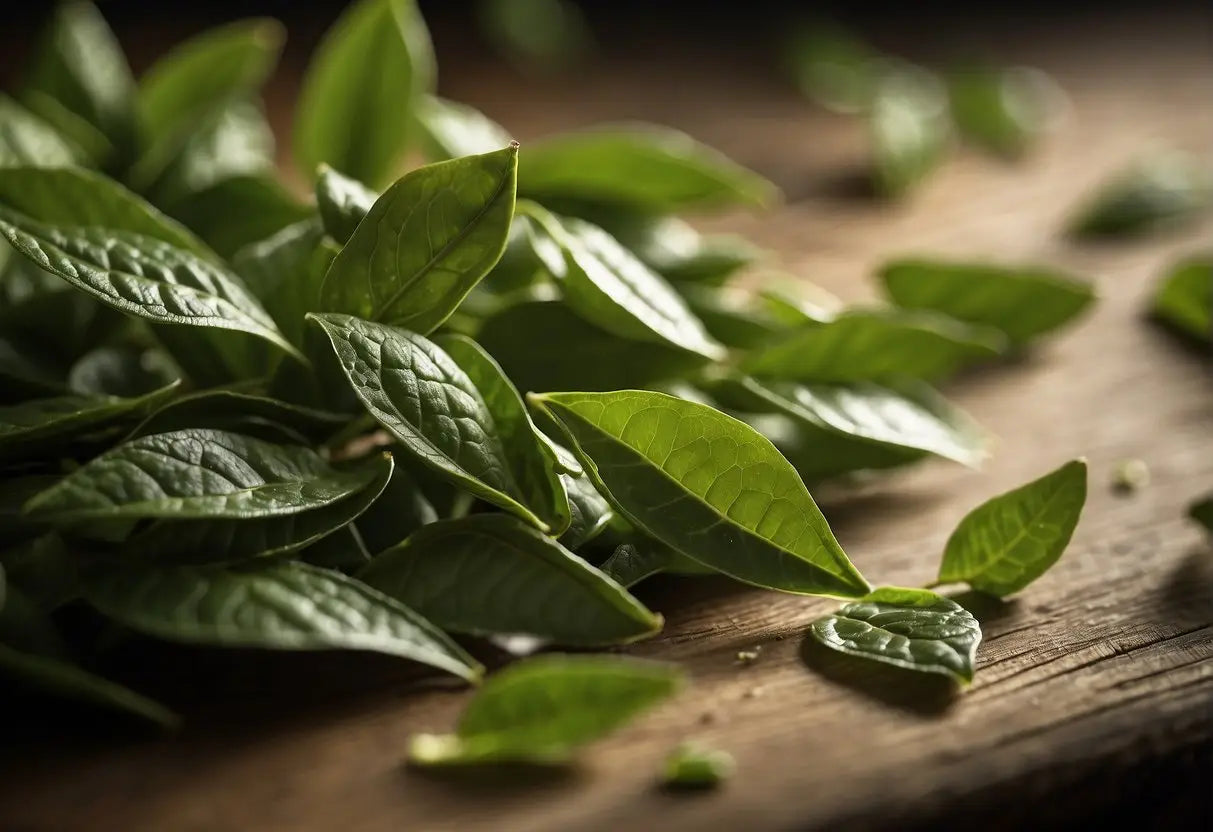
Hunger is controlled by a complex interaction between the digestive system, hormones, and the brain. The stomach and intestines secrete hunger-inducing hormones, such as ghrelin, which signal your brain that it's time to eat. Conversely, when you’ve eaten enough, your fat cells release the hormone leptin, which conveys to your brain that you are satiated and should stop eating.
Your blood sugar levels also play a vital role. When they drop, you feel hungry. After eating, carbohydrates from your food break down into glucose, which enters the bloodstream. Your body either uses this glucose for energy or stores it, causing blood sugar levels to rise and hunger to diminish.
Physical Activity increases hunger in most cases because your body requires more fuel for energy. After intense exercise, your body has expended energy and signals the need to replenish, typically increasing your appetite.
Stress can also trigger appetite changes. When stressed, your body produces cortisol, a hormone that may increase your appetite.
Here's how these mechanisms can potentially impact you with coffee or tea consumption:
- Caffeine Influence: Green tea contains caffeine which may influence blood sugar control and appetite, although individual responses vary.
- Appetite Modulation: The polyphenols in green tea are thought to potentially modulate appetite hormones, but research yields mixed results.
Remember, your individual experience may vary due to personal physiology and lifestyle factors.
Timing and Dosage Related to Hunger
When you consume green tea may influence your feelings of hunger. Drinking green tea in the morning can help you feel more awake due to its caffeine content. However, it should not be relied upon as a meal replacement since it does not provide substantial calories. Consuming it between meals could potentially help suppress your appetite in the short term.
The dosage of green tea also plays a critical role in its effect on your hunger levels. The typical recommendation is 1-3 cups per day. Excessive consumption might lead to digestive issues and an increased feeling of emptiness in the stomach due to its diuretic effect. Monitor how your body responds to different amounts.
- Morning: Might provide a modest suppressive effect on appetite due to caffeine.
- Between Meals: Can help with short-term appetite suppression; not a calorie source.
- Evening: Best avoided close to bedtime due to caffeine which may disrupt sleep.
Dosage Guidelines:
- 1 Cup: Unlikely to have a significant impact on hunger.
- 2-3 Cups: May promote a feeling of fullness and extend the time between meals.
- More than 3 Cups: May cause discomfort and increased frequency of urination.
Remember that individual responses to green tea can vary. Pay attention to how your body feels and adjust timing and dosage accordingly. If you experience increased hunger or other side effects, consider reducing the amount or changing the time of day you drink green tea.
Influence of Brewing Techniques
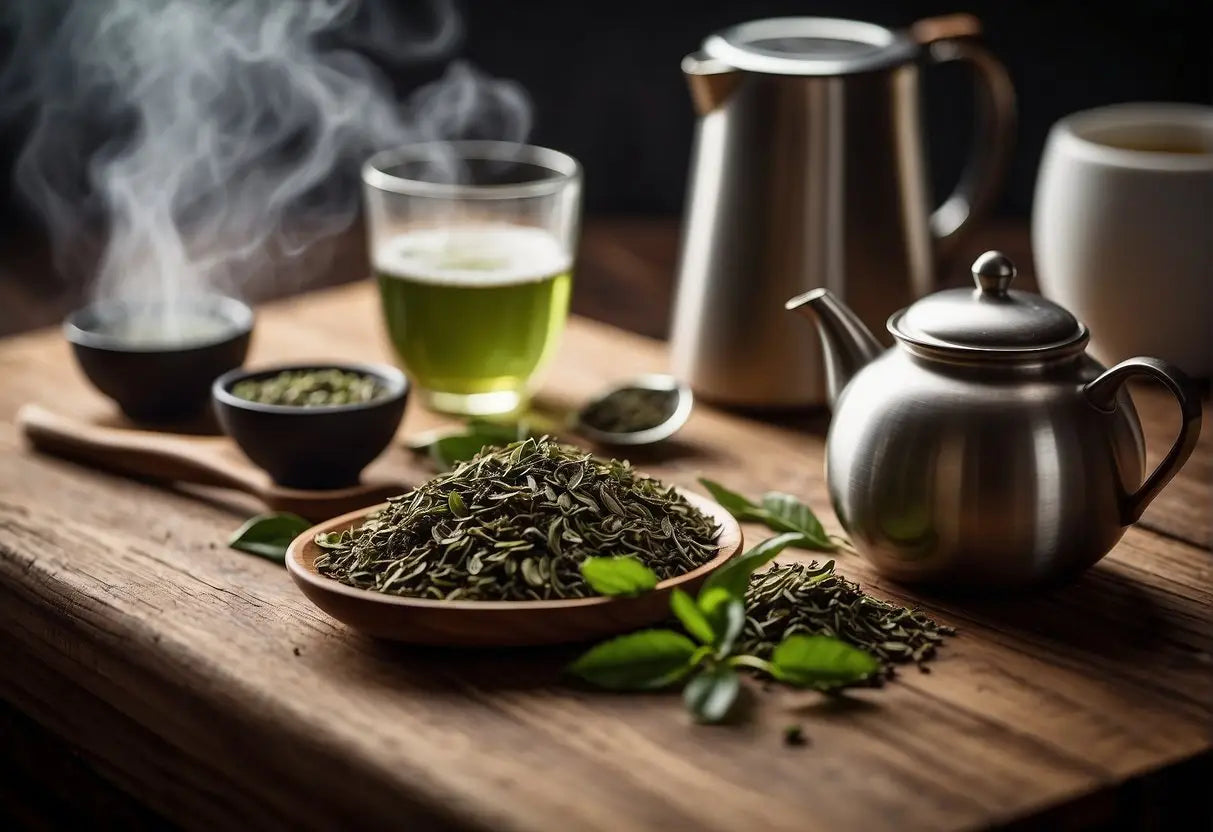
The way you brew green tea can have an influence on its potential to stimulate hunger. Brewing method, temperature, and time are factors to consider:
-
Brewing Method:
- Traditional Brewing: Steeping tea leaves in hot water tends to release more of the tea's natural compounds.
- Cold Brewing: This technique may result in a slightly different compound profile due to the lower extraction rate of certain compounds, possibly affecting hunger differently.
-
Water Temperature:
- Hot Water (~175°F): This temperature is considered ideal for green tea, balancing flavor extraction while preserving delicate compounds that may interact with your satiety levels.
- Boiling Water (>212°F): Using water that is too hot can lead to a bitter taste and may alter beneficial compounds in the tea that could affect how it influences hunger.
-
Brewing Time:
- Shorter Duration (1-2 minutes): Produces a milder tea with less caffeine, which could have a different effect on your appetite.
- Longer Duration (3 minutes or more): Allows for a stronger tea with more caffeine, potentially increasing its appetite-suppressing properties.
When adjusting your brewing technique, keep in mind that changes in the concentration of green tea's active ingredients, particularly caffeine and catechins, may affect hunger. A stronger brew generally leads to higher concentrations, though individual responses can vary. Experimenting with different methods can help you find the balance that works best for your body.
Comparison with Other Beverages
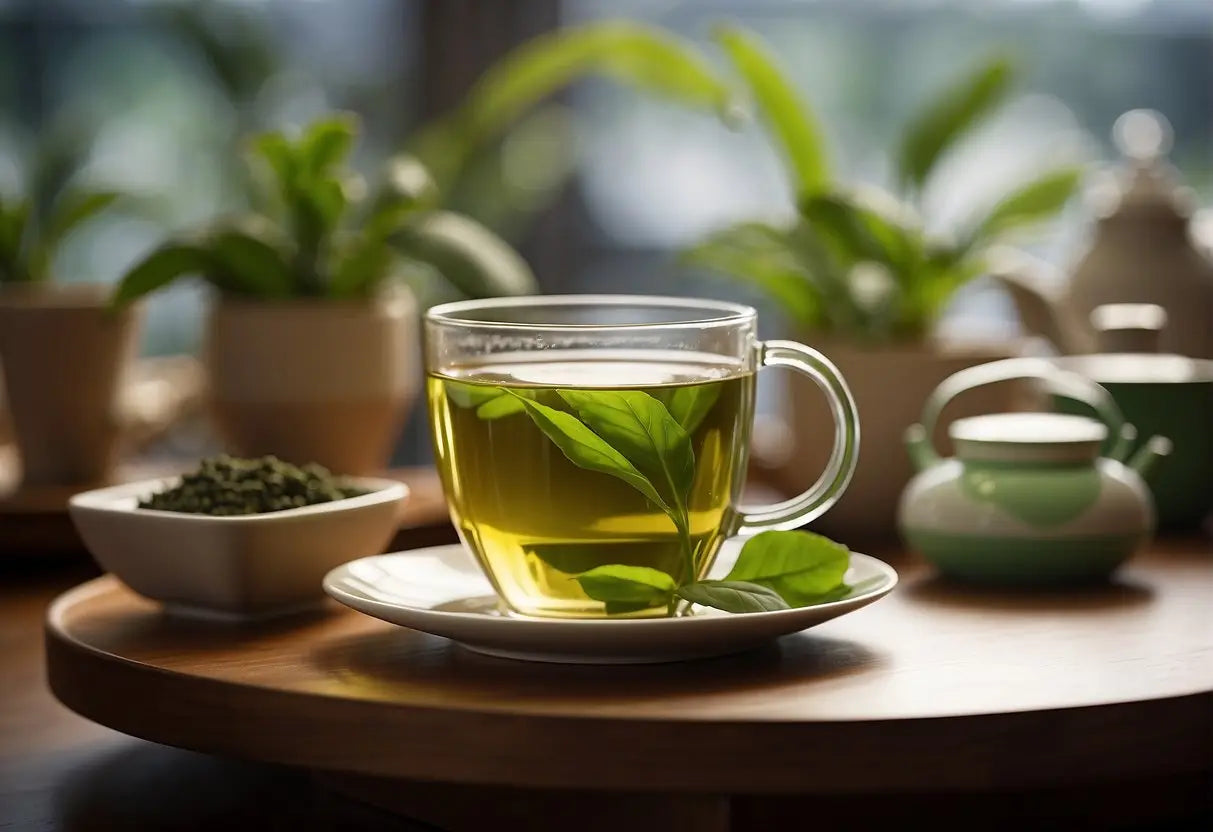
When considering whether green tea makes you hungry, it's useful to compare it with other commonly consumed beverages. This will help you understand how green tea might affect your appetite in relation to these alternatives.
Coffee:
- Appetite Suppression: Generally, coffee is stronger in caffeine content compared to green tea, which may lead to greater appetite suppression.
- Duration: The effect of coffee on appetite may be more immediate but short-lived, requiring more frequent consumption for sustained effects.
Water:
- Neutral: Drinking water has a neutral effect on hunger, although it can create a temporary sensation of fullness.
- Hydration Benefit: Water is essential for hydration, which can sometimes be mistaken for hunger.
Soda and Sweetened Drinks:
- Stimulates Appetite: High sugar content can initially suppress hunger but later lead to an increase in appetite due to blood sugar level fluctuations.
- Caloric Intake: These beverages add calories to your diet, unlike green tea, which has negligible calories when unsweetened.
Herbal Teas:
- Varies with Ingredients: Some herbal teas may contain appetite-suppressing herbs, while others do not have any significant effect on hunger.
- Low Calorie: Most herbal teas are low in calories, similar to green tea.
In contrast to these beverages, green tea contains compounds like catechins and a moderate amount of caffeine, which may slightly suppress your appetite or affect food intake. The effect can be both physiological and psychological and varies depending on your individual reaction to these compounds. However, green tea is unlikely to cause significant changes in hunger but may help in a small, supportive role as part of a weight management strategy.
Considerations for Different Diet Patterns
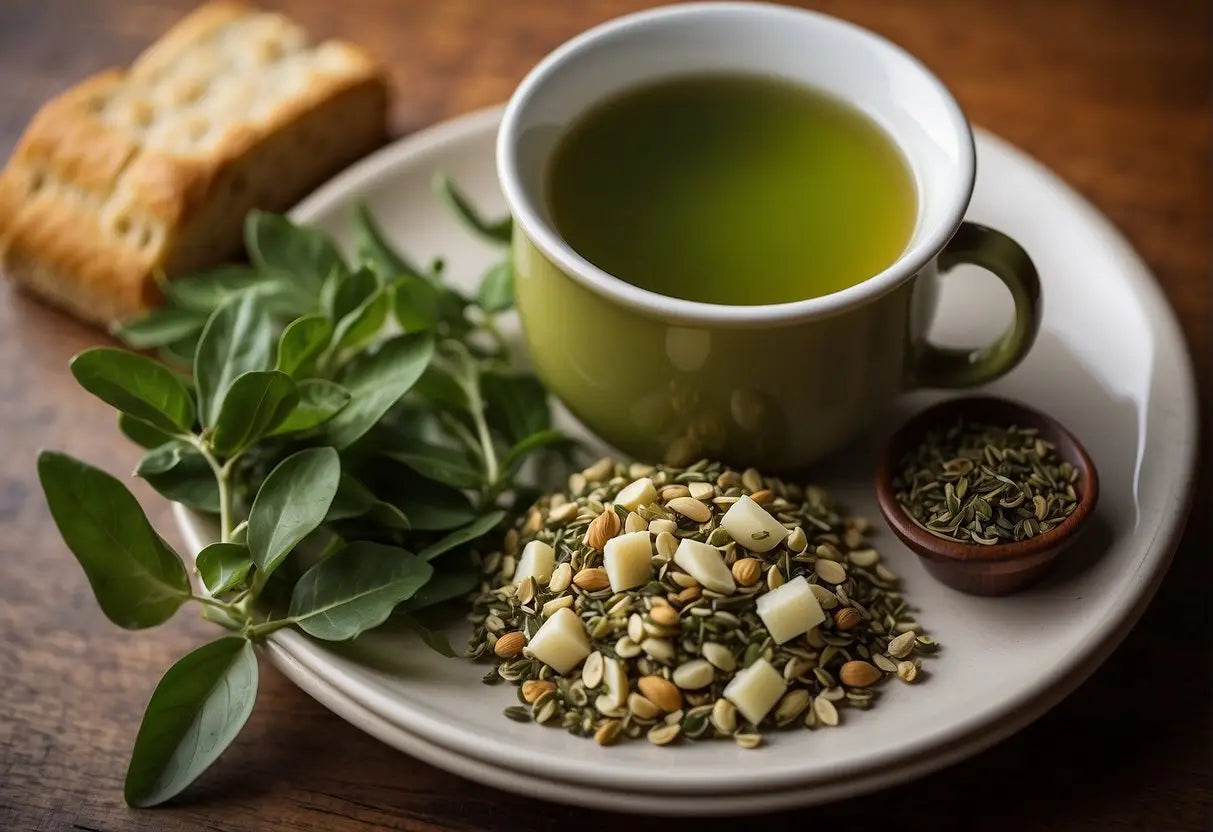
When integrating green tea into your diet, consider how it aligns with your existing dietary pattern. Here are a few dietary considerations:
-
Vegetarian/Vegan: You're likely focused on plant-based nutrients. Green tea is a fitting addition, being a natural, plant-derived beverage that can contribute to your antioxidant intake.
-
Keto: If you're following a ketogenic diet, you'll be pleased to know green tea is low-carb and can fit seamlessly into your regimen without affecting ketosis.
-
Intermittent Fasting: Since you're restricting eating to certain times, drinking green tea during fasting windows might increase your feeling of satiety, which can be beneficial.
-
High-Protein Diets: As you prioritize protein, green tea can be a calorie-free way to hydrate and may even aid digestion without substantial caloric intake.
Consider these factors with green tea consumption:
-
Caffeine Sensitivity: Green tea contains caffeine. If you are sensitive, monitor your body’s reaction, especially if consumed on an empty stomach, as it may cause or alleviate hunger.
-
Iron Absorption: Consuming green tea with meals can reduce iron absorption. If your diet is iron-dependent, it’s better to drink green tea between meals.
-
Hydration: Green tea contributes to your overall fluid intake. Ensure you balance it with water, especially in diets where hydration is key, like high-protein or high-fiber diets.
Remember, your individual metabolism and diet specifics will influence how green tea affects your hunger and overall health. It's always wise to consult with a nutritionist or healthcare provider when making dietary changes.
Potential Side Effects
When consuming green tea, you may experience a range of side effects that are important to be aware of:
- Appetite Changes: Some individuals report a change in appetite. While green tea can be an appetite suppressant for some, others may feel an increase in hunger.
| Appetite Response | Description |
|---|---|
| Suppression | May reduce your desire to eat. |
| Stimulation | Can occasionally lead to increased hunger. |
-
Caffeine-Related Effects: Green tea contains caffeine, which can lead to:
- Jitters or nervousness
- Difficulty sleeping
- An increased heart rate
Make sure you monitor your caffeine intake throughout the day.
-
Gastrointestinal Issues: You might experience stomach upset or discomfort, especially if consumed on an empty stomach.
-
Iron Absorption: Components in green tea, specifically catechins, may hinder iron absorption from foods. It is advisable to enjoy green tea between meals to mitigate this effect.
Remember to consult with a healthcare provider if you have any concerns or experience adverse effects after drinking green tea.
Frequently Asked Questions
Green tea can have varying effects on your hunger levels and weight management. Understanding these impacts can help you incorporate green tea into your diet effectively.
Can drinking green tea on an empty stomach affect hunger levels?
When you drink green tea on an empty stomach, it may lead to an increased production of gastric acid which can cause stomach discomfort and potentially increase your feelings of hunger.
What are the effects of green tea on weight loss and appetite?
Green tea contains catechins and caffeine which may boost metabolism and help in weight loss. Some individuals may experience a slight reduction in appetite after drinking green tea.
How does the consumption of green tea at night influence hunger?
Drinking green tea at night may affect sleep due to caffeine content, which can indirectly influence hunger levels the next day. It's typically not hunger-inducing but can vary from person to person.
Are there any specific components in green tea that might cause an increase in hunger?
Caffeine in green tea can sometimes stimulate your metabolism, which might lead to increased feelings of hunger in some individuals.
What is the relationship between matcha consumption and feelings of hunger?
Matcha, a form of green tea, is rich in catechins and could help moderate hunger due to its potential effect on thermogenesis and fat oxidation.
How might drinking tea when already hungry impact hunger and satiety?
If you're already hungry, drinking green tea might provide a temporary feeling of fullness, but it's not a substitute for calories. Thus, you may still feel hunger after the initial satiating effect wears off.
← Older post Newer post →











